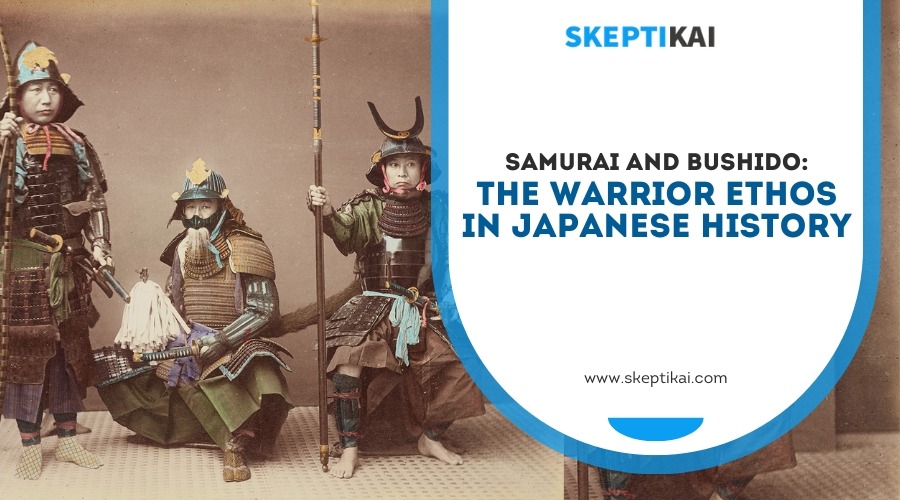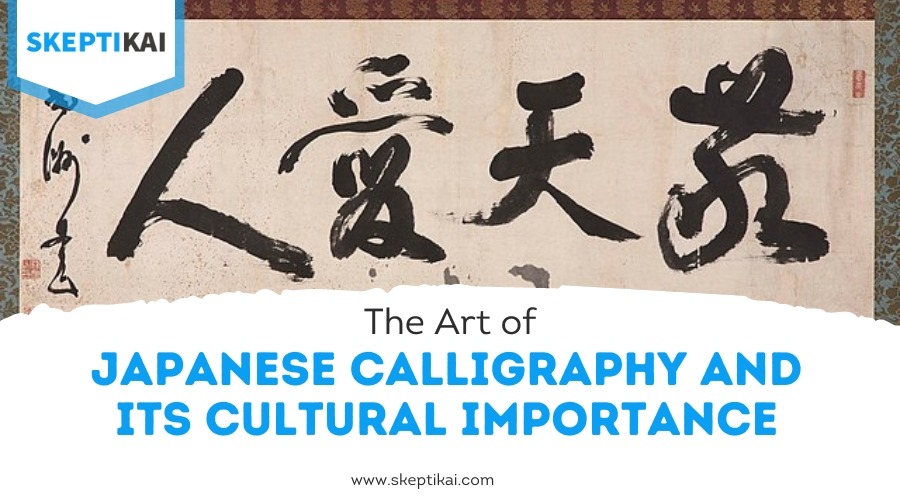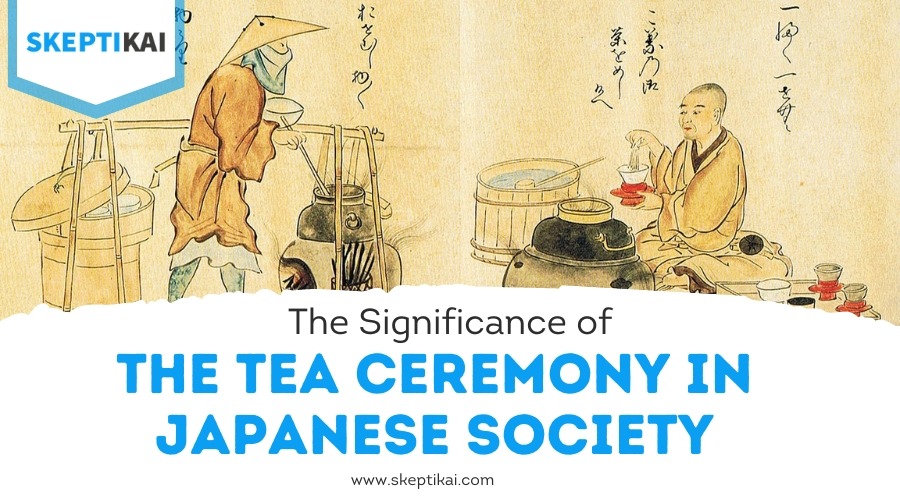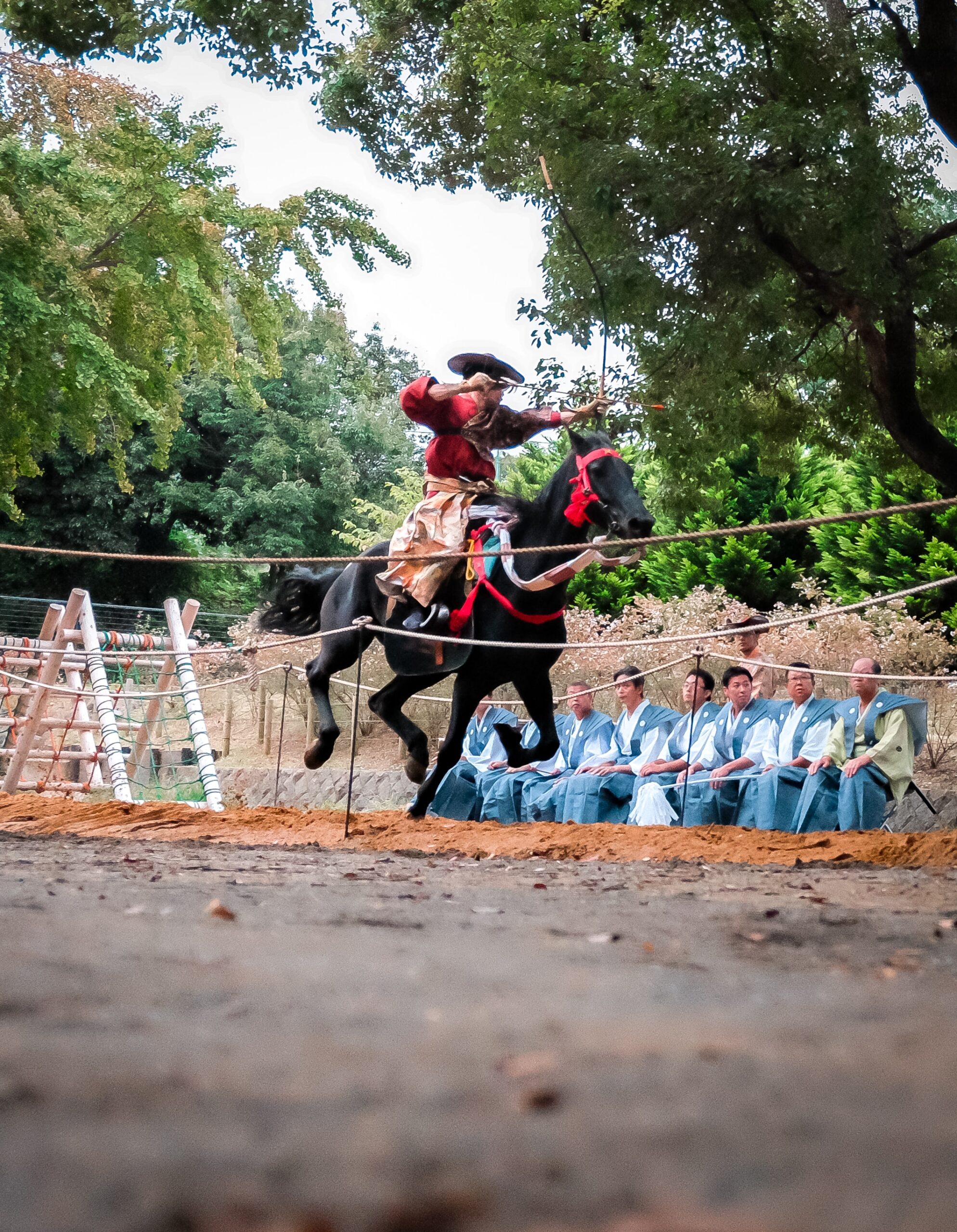How Did the Samurai Influence Japanese Culture?
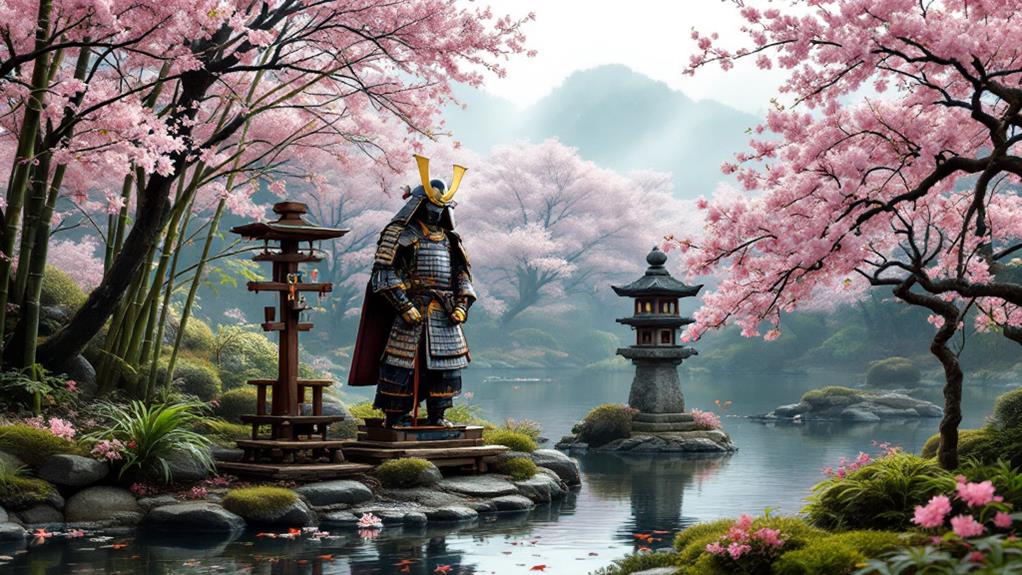
You'll find the samurai deeply embedded in Japanese culture, shaping ethical values and behaviors based on loyalty, honor, and courage through Bushido. This influence extends to martial arts like Kendo and Judo, emphasizing relentless self-improvement. Samurai stories and poetry enrich Japanese literature, reflecting themes of duty and valor. Their aesthetic sense influenced traditional and modern fashion, with garments like hakama still popular. Today, samurai ideals pervade pop culture, from films to video games, connecting historical virtues with contemporary creativity. Investigate further to understand how these ancient warriors continue to shape Japan's cultural identity.
Bushido and Ethical Values
Bushido, the code of the samurai, embodies the principles that have deeply influenced Japanese ethical values. When you investigate samurai ethics, you'll find they revolve around loyalty, honor, and courage. These moral codes aren't just ancient ideals; they've shaped how Japanese society views duty and respect. By internalizing these values, the samurai established a framework that emphasized personal conduct and societal roles. The samurai class emerged as military nobility during the Heian period, playing significant roles in historical conflicts that shaped their ethical framework. Imagine living in a world where your actions are guided by unwavering loyalty and a commitment to honor. In samurai ethics, every decision reflects your integrity and dedication to a higher cause. This isn't just about individual reputation; it impacts the collective well-being. The moral codes demand that you act with sincerity and responsibility, influencing how you interact with others. Even today, you can see traces of these principles in Japan's cultural norms. The emphasis on respect, regardless of in business or personal relationships, mirrors the samurai's commitment to harmony and duty. As you investigate this world, you'll realize that Bushido isn't just a historical artifact. It's a living code, continuing to shape ethical perspectives and cultural interactions in modern Japan.
Impact on Martial Arts
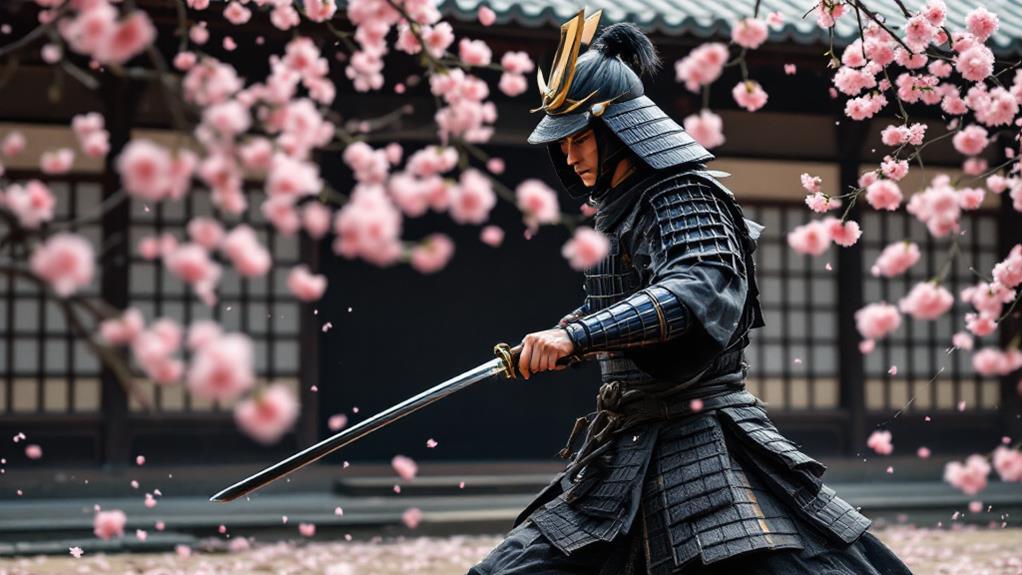
Many recognize the profound impact the samurai have had on the development of Japanese martial arts. When you think of the samurai, images of masterful sword techniques likely spring to mind. These warriors didn't just wield their swords with unmatched skill; they also laid the foundation for martial arts that are still practiced today. Their expertise in swordsmanship, particularly with the katana, shaped styles like Kenjutsu and Kendo. By studying these disciplines, you can trace a direct line back to the samurai's precise and deliberate movements.
In addition to their swordsmanship, the samurai's influence is evident in other traditional arts such as Aikido and Judo, which emphasize the philosophy of discipline. Beyond their physical prowess, the samurai's influence extended to their training philosophy. They believed in relentless practice and discipline, values that continue to underscore martial arts training today. When you're training, you're not just learning how to move efficiently; you're also adopting a mindset focused on self-improvement and perseverance. This philosophy helps martial artists cultivate a balance between body and mind, a principle deeply rooted in the samurai way.
As you explore deeper into martial arts, keep in mind that you're part of a legacy that began with the samurai's dedication to honing their skills and embodying a warrior spirit that transcends time.
Influence on Japanese Literature
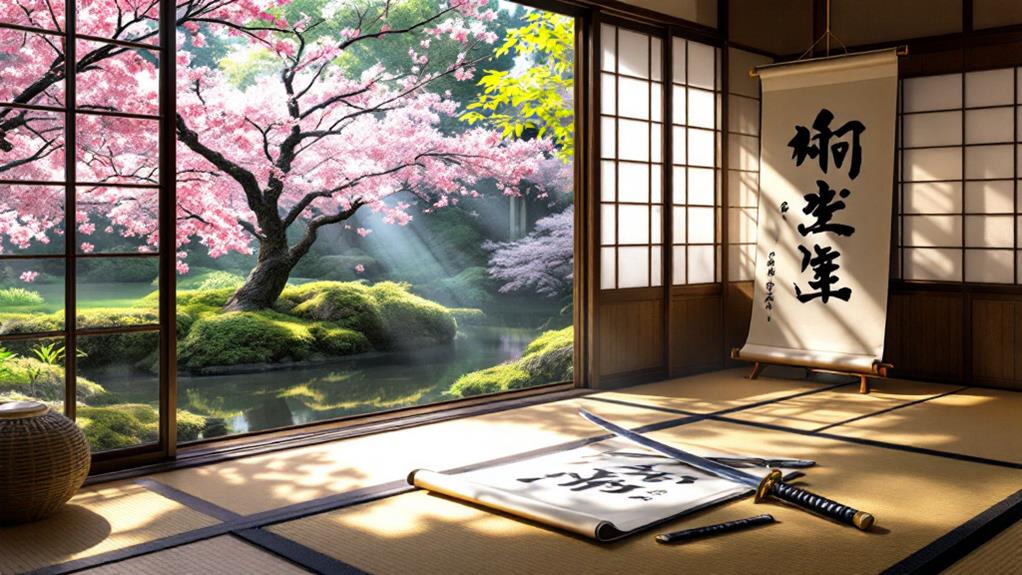
Samurai have left an indelible mark on Japanese literature, enchanting readers with tales of honor, loyalty, and valor. You can't investigate Japanese literary history without encountering the profound influence of the samurai. Their stories have been immortalized in diverse forms, from samurai poetry to historical narratives. These works capture the essence of the samurai spirit, illustrating the complex moral and ethical codes they lived by.
When exploring samurai poetry, you'll find that it often reflects the warriors' internal struggles, their reflections on life and death, and their unwavering commitment to duty. Haiku and tanka poems encapsulate their philosophical musings and emotional depth, offering a window into the samurai's mind. These poetic expressions continue to inspire and resonate with readers, providing timeless insights into the human condition.
Historical narratives, such as "The Tale of the Heike," bring the samurai period to life with vivid storytelling. These narratives recount epic battles, political intrigues, and personal sacrifices, painting a rich tapestry of Japan's feudal past. They serve as a confirmation to the enduring legacy of the samurai, shaping your understanding of Japanese culture and its literary tradition.
Samurai and Japanese Fashion

As you investigate Japanese culture, the influence of the samurai extends beyond literature and into the domain of fashion, where their impact is both profound and enduring. Samurai armor, with its intricate design and functionality, serves as a demonstration of the fusion of practicality and artistry. By examining these armors, you can see how the samurai prioritized both protection and style, a duality that continues to inspire Japanese fashion today.
Traditional garments like the kimono also carry traces of samurai influence. During the Edo period, samurai often wore kimonos that signified their rank and clan, with specific colors and patterns conveying their status. This attention to detail and symbolism in clothing is a hallmark of Japanese fashion that persists. You'll notice that even in contemporary designs, the elegance and restraint characteristic of samurai attire subtly influence modern aesthetics.
Moreover, the hakama, a type of wide-legged pants worn by samurai, remains a popular garment, reflecting the samurai's lasting legacy in Japanese attire. By understanding these elements, you appreciate how the samurai's sense of style and discipline continues to shape traditional garments and influence modern Japanese fashion.
Legacy in Modern Pop Culture
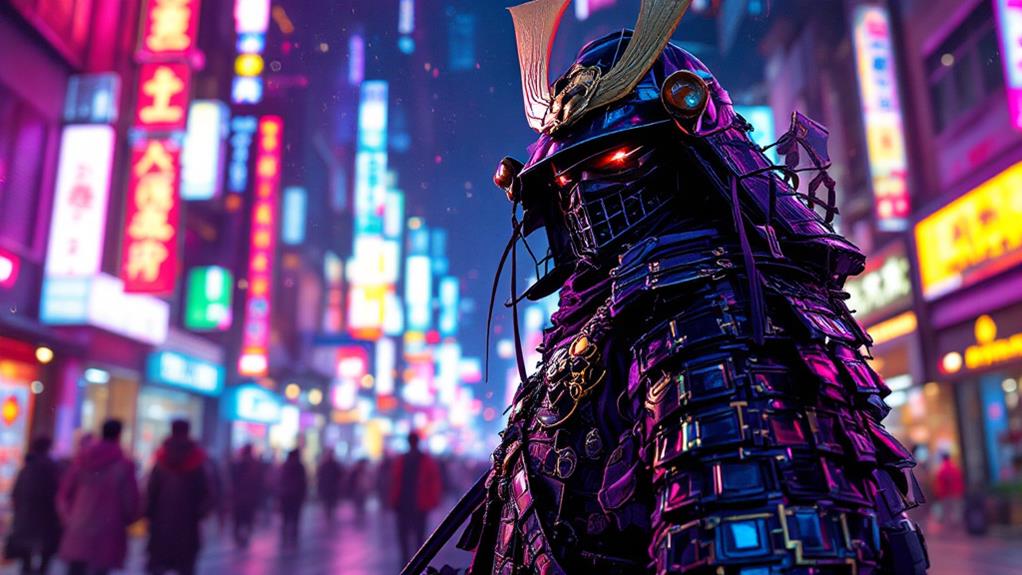
Often, when you investigate modern pop culture, the enduring legacy of the samurai becomes unmistakably clear. Samurai symbolism and representations have permeated diverse forms of media, capturing the imagination of audiences worldwide. In movies, television, and anime, you'll frequently encounter characters embodying the samurai's honor, discipline, and martial prowess. These traits are not just historical reflections but have become archetypes that inform storylines and character development.
In the gaming world, samurai representations are prevalent, offering players the chance to experience the life of a warrior. Games like "Ghost of Tsushima" and "Sekiro: Shadows Die Twice" allow you to plunge into engaging worlds where samurai values and aesthetics take center stage. Here, samurai symbolism is not merely decorative but integral to gameplay, influencing everything from combat styles to narrative choices.
Even in fashion and art, samurai influences persist. Designers often incorporate samurai motifs, reflecting their elegance and strength. You'll see this in everything from streetwear to high fashion, where the samurai's iconic armor and swords inspire modern designs. Fundamentally, the samurai's legacy continues to shape and enrich pop culture, connecting past virtues with present creativity.
